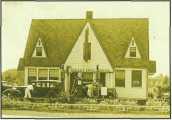 |
Home | Search | Browse | About IPO | Staff | Links |
 |
Home | Search | Browse | About IPO | Staff | Links |
|
"When I tell my kids and grand kids and even great grand kids about working for five cents an hour, ten hours a day, seven week—they just can't believe it!" |
Dorothy divides Farmersville's religious groups of those days into Protestants, Catholics, and Lutherans. Although she and Cecil were Protestants, most of their waitresses turned out to be Catholics. Recently Dorothy got a letter from her very first waitress, Merle-Ree Behl of Morrisonville.
"When I tell my kids and grand kids and even great grand kids about working for five cents an hour, ten hours a day, seven days a week—they just can't believe it!" Merle-Ree wrote. "But I felt lucky. When I got a raise to $5 a week, I could even save some. You guys taught me a lot and you were always good to me. We cooked on that coal stove in the hot summer with no air conditioning, didn't we? It was just the thing to do then and we didn't think anything about it. I'm glad I had that experience, even though I didn't like to be called 'Hoot'!"
"We called her 'Hoot' because she went 'Hoot! Hoot!'when she rounded a corner with a tray of food," Dorothy said. "It wasn't a large cafe." Dorothy remembers the Chicago World's Fair years, 1932 and 1933, as being particularly busy. Harry and Fred even set up several octagonal cabins and a shower shed out back for the travelers. One night a bus with forty passengers pulled up at 4 a.m. Eddie just knocked on Dorothy's door and somehow everyone got served.
|
Dorothy Burnet Hampton (2nd row, left) |
 The Hendricks Brothers Service Station in Farmersville, circa 1935. |
Business also picked up when Prohibition ended and the Hendricks brothers, over Dorothy's objections, had a beer tap put in. And when the sheriff allowed slot machines for a time, local traffic picked up. One afternoon, a beer truck driver rushed in, fearing he was about to be hijacked. Another day, a man carrying only a bale of cotton atop his car stopped and asked for a glass of water. Cecil met everyone well, although he kept a constant eye on "gypsies" and had blacks sit at the counter instead of in the booths.
After seven years working for the Hendricks brothers, Cecil bought his own cafe a few miles down Route 66 in Waggoner. The Hendricks sold out to Art Mclnamey and Mike Gorman, who'd operated a restaurant on the other side of 66 since 1934. The new owners moved part of their own building across the road, attached it to the older business, and reopened as Art's Cafe. A fire destroyed that structure in 1952. Long before then, the octagonal cabins had been sold for hen houses. The Mclnameys, however, put up a new, larger restaurant and a modern, two-story motel. The motel's business has since dwindled away to nothing, but the restaurant remains a community institution.
The Village of Waggoner stands on land deeded to the community by Dorothy's aunt, Elizabeth McCullouch Waggoner. Dorothy worked at the new cafe for a few years. Then a regular customer, the local banker, lured her away to a long-term career as his office manager. When Cecil died, she took an apartment in Springfield. She lives now at the Illinois Presbyterian Home in that city. In June of this year, she observed her ninetieth birthday with a few rounds of bridge.
"I always expected to get old," she said. "But I didn't think about being ninety." She's impressed. Her body may be graduating to the frail side, but her mind and spirit are strong. And at Illinois Presbyterian, she enjoys the same blend of community and independence that's characterized her entire life along Route 66.
Illinois Heritage | 09
|
|